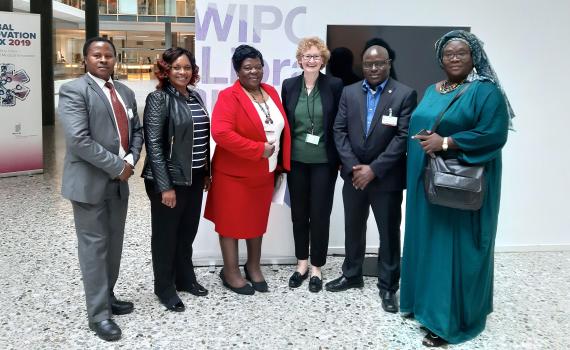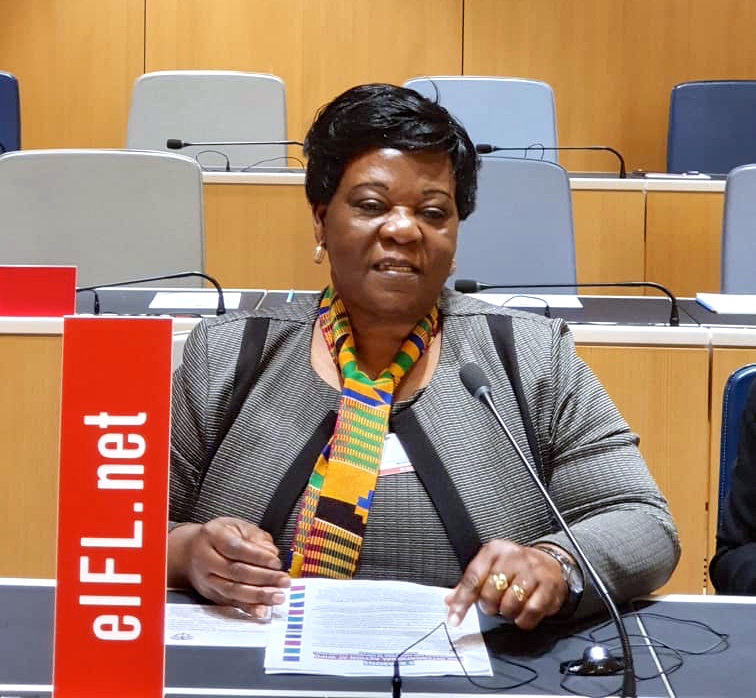
A team of librarians from EIFL partner countries, Senegal, Zimbabwe, Kenya and Uganda/USA, participated in the World Intellectual Property Organization (WIPO) Standing Committee on Copyright and Related Rights (SCCR/39) that met in Geneva from 21-25 October 2019.
The SCCR/39 session was preceded by an International Conference on Copyright Limitations and Exceptions (L&Es) for Libraries, Archives, Museums and Educational & Research Institutions. The International Conference heard and discussed findings of regional seminars on L&Es in Africa, Asia Pacific and Latin America and the Caribbean, held in 2019. The SCCR’s mandate on L&Es, as agreed by the WIPO General Assembly in 2012, is to consider an international instrument (such as a treaty, model law or joint recommendation) to promote the needs of libraries, archives, museums, education and research.
During the SCCR/39 session, and at the International Conference, three core issues emerged from the discussions: 1) there was clear recognition that L&Es are intrinsic to a balanced copyright system; 2) there was wide acknowledgement that copyright laws in many countries are falling behind in the digital age, and 3) there was emerging consensus on the urgent need to support preservation and access to cultural heritage, a core public interest activity of libraries, archives and museums.
APPEAL TO WIPO
EIFL librarians appealed to WIPO, the global policy-making forum on copyright, for help in addressing copyright problems faced by libraries, archives and museums around the world, citing the success of the Marrakesh Treaty in boosting worldwide adoption of exceptions for blind and visually impaired people.
“I am proud that Zimbabwe recently adopted the Marrakesh Treaty. But without the Treaty, we wouldn’t even be talking about exceptions for blind people. Marrakesh made the issue a priority among all the competing issues that our government is facing, such as dealing with the economy and food issues,” said Kathy Matsika, EIFL Copyright Coordinator in Zimbabwe, in a statement to the committee.
At the WIPO Regional Seminar on Libraries, Archives, Museums and Educational & Research Institutions held in Nairobi in June 2019, member states agreed that exceptions in Africa lag far behind the rest of the world, and that copyright barriers to the preservation of cultural heritage, in particular, should be eliminated. “We look for international support to help address copyright obstacles for libraries in Africa, and the rest of the world, that are working hard supporting literacy, education and attainment of the SDGs (Sustainable Development Goals),” continued Kathy in her statement.
Despite intense negotiations, however, member states could not reach agreement on the future work programme on L&Es. Discussions will continue at the next session of SCCR on 29 June-3 July 2020. The Secretariat will also prepare factual reports of the three regional seminars and the International Conference, as well as inputs at the conference on the way forward, for consideration by the committee.
Emerging consensus on digital preservation
Data from the WIPO Study on Copyright Limitations and Exceptions for Libraries and Archives (2017) shows that while almost 75% of countries have some type of provision on preservation, only 30% allow for digital preservation and most countries do not permit cross-border uses of preservation copies. Developed countries typically fare the best in this regard, while many developing countries lag behind.
At all three regional seminars (Asia-Pacific, African, Latin America and the Caribbean regions) that took place in 2019, preservation emerged as an area in need of urgent attention. Member states agreed that preservation should be pre-emptive, digital and that cross-border uses should be permitted to enable cooperation between institutions.
The call for global action on preservation was especially strong from regions experiencing devastating storms and hurricanes due to climate change, such as the Caribbean, countries affected by armed conflict, and countries where events such as fires or floods have threatened, or wiped out, irreplaceable collections.
Of course, no country, wherever it is located or whatever its economic situation, is immune from accident or natural disaster. In all countries, libraries stand to benefit from a clear legal framework that helps to safeguard national heritage and supports cooperation between institutions on preservation. A good example of such a framework, at the regional level, is in the European Digital Single Market (DSM) Directive adopted in 2019. The DSM Directive contains a new, mandatory exception for preservation by cultural heritage institutions that applies across borders in all EU member states.
However, at WIPO, the European Union (EU) continues to oppose discussion on any action to support library activities, including preservation. In effect, the EU seeks to deny to libraries outside the EU what it has deemed necessary for libraries and other cultural heritage institutions within the EU. It once again raises the question of why the EU continues to oppose work at WIPO on exactly the same issues, because just as libraries in France and Germany, for example, may wish to undertake culturally important preservation activities, so too might libraries in Spain and Argentina wish to engage in cooperation.
Further information about SCCR/39
EIFL was represented at SCCR/39 by Awa Diouf Cissé (Senegal), Kathy Matsika (Zimbabwe), Janegrace Kinyanjui and Joseph Kavula (Kenya), Dick Kawooya (Uganda/USA), and Teresa Hackett, EIFL Copyright and Libraries Programme Manager. In addition, Dick Kawooya participated in the conference panel on libraries.
SHARE / PRINT









